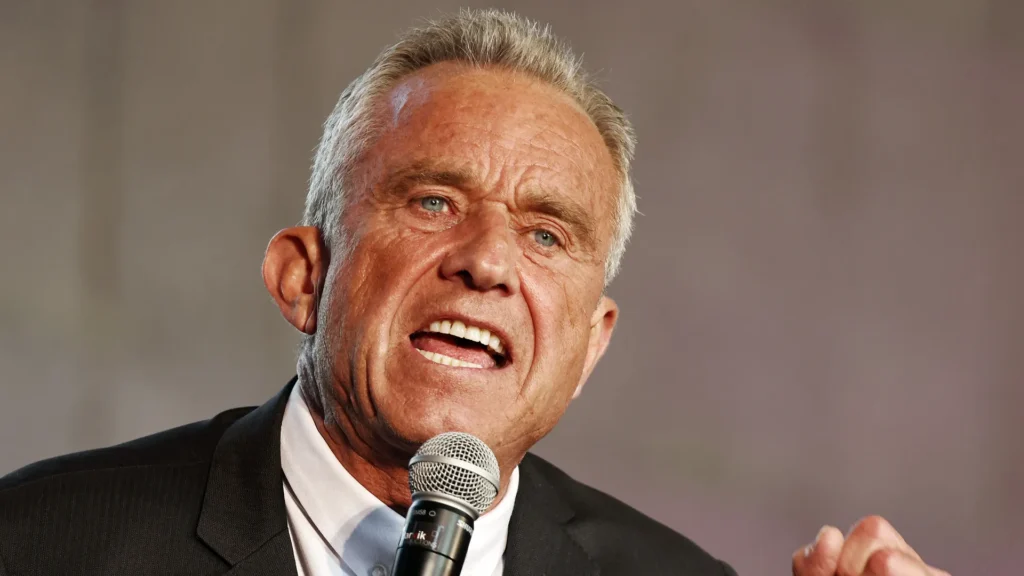Robert F. Kennedy Jr. has emerged as a significant voice in the debate over America’s obesity epidemic, offering a unique perspective that frames the issue as a systemic and environmental crisis rather than solely an individual responsibility. As part of his broader campaign to “Make America Healthy Again,” Kennedy argues that the root causes of obesity go beyond personal choices and are instead deeply embedded in the country’s food system, environmental policies, and healthcare structure. His arguments provide a fresh lens through which to view the obesity crisis, emphasizing the role of corporate interests, processed food, and toxic chemicals in deteriorating public health.
The Scale of the Problem
Kennedy highlights the alarming statistics that reflect America’s growing health crisis. According to him, nearly 74% of Americans are now classified as overweight or obese, with obesity affecting 40% of adults and 20% of children. These figures are not just a reflection of modern living but a stark contrast to historical norms. Kennedy points out that, 120 years ago, obesity was so rare that people with the condition were sometimes displayed in circuses. Today, however, the problem has become normalized, contributing to widespread chronic disease, including diabetes, heart conditions, and other obesity-related health issues.
Ultra-Processed Foods: A Key Culprit
One of Kennedy’s main arguments is that the modern food system, dominated by ultra-processed foods, is a significant driver of the obesity epidemic. He critiques the fact that much of the food available in supermarkets is laden with unhealthy fats, sugars, and chemicals, designed to be addictive and convenient but devoid of real nutritional value. He argues that these foods, produced and marketed by large corporations, have distorted the natural relationship people once had with food, prioritizing profits over public health.
Kennedy also ties the rise of ultra-processed foods to the increase in chronic diseases, noting that the healthcare system is primarily focused on treating these diseases rather than preventing them. He emphasizes that 86% of the $4.3 trillion the U.S. spends annually on healthcare goes toward managing chronic conditions that, in many cases, are preventable through better diet and lifestyle choices.
Environmental Toxins and Obesity
Beyond food, Kennedy believes that environmental toxins play a significant role in the obesity crisis. He has long been a critic of how chemical pollutants, many of which are found in everyday products, disrupt the body’s natural systems. He contends that these toxins—often found in plastics, pesticides, and other industrial products—contribute to obesity by interfering with metabolic functions. This concept, known as “obesogens,” suggests that certain chemicals can promote fat accumulation and make it more difficult for individuals to maintain a healthy weight.
Kennedy argues that addressing obesity requires confronting the corporate interests that have normalized the use of these harmful substances in food production and the environment. He believes that a regulatory overhaul is necessary to reduce the exposure of Americans to these toxins and improve public health outcomes.
Healthcare: Focusing on Prevention
Kennedy’s critique extends to the American healthcare system, which he views as reactive rather than proactive. He points out that while the U.S. spends more on healthcare than any other nation, its outcomes are among the worst, particularly when it comes to managing chronic diseases. Kennedy advocates for a shift in healthcare toward prevention, particularly by improving the quality of food available to consumers and reducing their exposure to harmful environmental chemicals.
He believes that by tackling the root causes of obesity and other chronic diseases, the healthcare system can be transformed from one that primarily treats symptoms to one that fosters long-term wellness.
What Needs to Change
Kennedy’s vision for addressing obesity involves several key changes:
- Regulating Ultra-Processed Foods: Kennedy advocates for stricter regulations on food manufacturers to limit the production and sale of ultra-processed, nutritionally deficient foods. This could involve clearer labeling, taxes on sugary and fatty foods, and incentives for the production of whole, unprocessed foods.
- Reducing Environmental Toxins: Kennedy calls for a regulatory crackdown on the chemicals and pollutants that contribute to obesity and other chronic conditions. This includes stronger controls on pesticides, plastics, and industrial pollutants that act as endocrine disruptors and “obesogens.”
- Focusing Healthcare on Prevention: A major component of Kennedy’s plan is to shift healthcare resources toward prevention, encouraging a model that promotes healthy eating, exercise, and detoxification rather than merely treating chronic conditions after they arise. He advocates for more public health campaigns that educate people about the dangers of processed foods and environmental toxins.
- Tackling Corporate Interests: Kennedy frequently emphasizes the need to address the influence of corporate interests in both the food and healthcare industries. He believes that corporations, through their lobbying efforts and profit-driven practices, have contributed to the normalization of unhealthy lifestyles. Kennedy proposes stronger oversight and accountability measures to curb corporate malfeasance in these sectors.
- Education and Public Awareness: Kennedy sees education as a critical tool in combating obesity. He proposes large-scale public health campaigns that inform people about the risks of processed foods and the importance of a clean environment. By making people aware of how corporate practices have harmed their health, he believes Americans will be better equipped to make healthier choices.
Conclusion
Robert F. Kennedy Jr.’s perspective on the obesity epidemic challenges the conventional wisdom that frames the issue as merely a personal responsibility. By highlighting the role of processed foods, environmental toxins, and a reactive healthcare system, Kennedy calls for a systemic overhaul that prioritizes prevention and addresses the corporate forces contributing to the crisis. His proposals reflect a broader vision of public health, one that seeks to make America not just thinner but healthier overall, by reclaiming control over the food system, reducing environmental pollutants, and transforming healthcare into a tool for prevention rather than treatment.
If these changes were implemented, the hope is that America could see a reversal in its obesity epidemic and, ultimately, a reduction in the chronic diseases that are crippling the healthcare system
